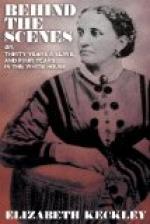to death with work. The children grew puny and
sickly for want of proper care. The doctor said
it was because the milk the mother nursed to them
was so heated by her constant and excessive labors
as to be unwholesome, and she never had time to cool
before ministering to them. So the little things,
instead of thriving and developing, as was their right,
dwindled toward the inevitable end. Oh! we were
wretched—our hearts ached for a day which
we could call our own. My wife was a Christian,
and had learned to know the worth of prayer, so would
always speak consolingly. “God will help
us,” she said: “let us try and be
patient.” Our trial went on, until one morning
I heard a great fuss in the house, the madam calling
for the yard man to come and tie my wife, as she could
not manage her. My wife had always refused to
allow the madam to whip her; but now, as the babies
were here, mistress thought she would try it once
more. Matilda resisted, and madam called for
Boss. In a minute he came, and, grabbing my wife,
commenced choking her, saying to her: “What
do you mean? Is that the way you talk to ladies?”
My wife had only said to her mistress: “You
shall not whip me.” This made her furious,
hence her call for Boss. I was in the dining
room, and could hear everything. My blood boiled
in my veins to see my wife so abused; yet I dare not
open my mouth. After the fuss, my wife went straight
to the laundry. I followed her there, and found
her bundling up her babies’ clothes, which were
washed but not ironed. I knew at a glance that
she was going away. Boss had just gone to the
city; and I did not know what to say, but I told her
to do the best she could. Often when company
came and I held the horses, or did an errand for them,
they would tip me to a quarter or half a dollar.
This money I always saved, and so had a little change,
which I now gave to Matilda, for her use in her effort
to get away from her cruel treatment. She started
at once for Forrest’s trader’s yards, with
the babies in her arms and, after she got into Memphis,
she stopped outside the yard to rest. While she
was sitting on the curb stone, Forrest came out of
the yard by the back gate and saw her. Coming
up to her he said: “My God! Matilda,
what are you doing here? You have changed so I
would not have known you. Why have you come here?”
Matilda said: “I came back here to be sold
again.” He stepped back and called another
“nigger trader,” Collins by name, from
Kentucky. “Look here,” said Forrest,
pointing to my wife. Collins took in the situation
at once and said he would buy her and the children.
“That woman is of a good family,” said
he, “and was only sold to prevent her from getting
her freedom.” She was then taken into the
yard. “Oh!” said Forrest, “I
know these McGees, they are hard colts.”
Word was then sent McGee that his cook was in the yard
and had come to be sold. He went in haste to
the yard. Collins offered to buy her, but McGee
said no man’s money could buy that woman and




